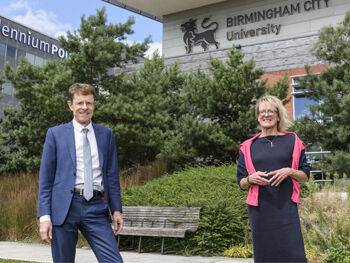University News Last updated 27 July 2020

Plans to create a West Midlands National Park have taken a step forward after the West Midlands Combined Authority (WMCA) signed a memorandum of understanding (MoU) with Birmingham City University.
The MoU formalises the WMCA’s backing for the national park, which is seen as a key component of a post-Covid green economic recovery. The park forms part of #WM2041, the West Midlands’ zero-carbon strategy, which was agreed by the WMCA board last month.
The idea for a West Midlands National Park (WMNP) was envisioned by Kathryn Moore, Professor of Landscape Architecture at Birmingham City University. The project seeks to establish a new kind of national park for the West Midlands. Despite being the birthplace of the industrial revolution and containing a complex infrastructure of motorways, roads and canals, the West Midlands is also home to major agricultural areas and beautiful open spaces.
Andy Street, the Mayor of the West Midlands, said: “A new type of national park in the West Midlands is an ambitious idea that will preserve and enhance the environment of our region, whilst creating a better quality of life for our citizens.
The plan for the national park includes the whole of the WMCA territory, stretching from headwaters of the Tame in the Black Country to the Blythe and Tame Valley in the East, from Wolverhampton, Walsall, Sandwell and Dudley, to Birmingham, with Solihull and Coventry in the south. It contains a variety of features to make the region a greener, healthier place in which to live and work including patterns of parks and squares that are easy and pleasant to walk through. Potential new housing developments would make the most of the beauty of the region by opening up views, horizons, and skylines and creating green spaces in the towns and cities.
Professor Julian Beer, Deputy Vice Chancellor of Birmingham City University said: “The West Midlands National Park project has the potential to transform the way that the region prepares itself for the future, ensuring that all of our environmental, societal and economic goals are met while improving the quality of life for everyone. At BCU we see the development of the Knowledge District on the East side of Birmingham as a key early project. Building on existing partnerships with Mercian Studios, HS2, Bruntwood and others, in addition to our STEAMhouse project and the £60m rejuvenation of the Belmont Works, this agreement signals an exciting re-birth for Birmingham and the region.”
Prof. Moore added: “It is tremendous to have an agreement between the WMCA and the BCU WMNP Lab. The West Midlands National Park is very different from a traditional national park. We are talking about a new kind of urban national park, one that brings the experience of national parks to urban populations rather than expecting people to travel to remote places. It’s about rekindling the relationship we have with the landscape, our sense of belonging and identity our sense of pride and desire to create a better future for our children and grandchildren. This is precisely what we need to have at the top of our political agenda in order to deal with climate change, to give plentiful access to quality green space and nature, provide cleaner air, water, soil and fresh food and create thriving self-sufficient communities post Covid-19.
“It will contribute towards the West Midlands having healthy places in which to live and work and becoming the best region to live in the UK because of the quality of the environment, quality of jobs and quality of education. Essentially the WMNP is an economic, social and environmental proposition that will bring many different strategies and ambitions together to transform the region.”
The signed memorandum is the latest step in a fifteen-year programme of research and paves the way for the development of a programme of projects.
Cllr Ian Courts, leader of Solihull Metropolitan Borough Council and WMCA portfolio lead for environment said: “The plans for the national park show how we can bring nature, clean air and limited traffic to all of us across the region.
“Solihull’s European Regional Development Fund “Wildlife Ways” project shows what is possible and I now see a floral explosion across our borough that is not only improving the environment for the benefit of people and wildlife alike, but is also bringing beauty to our communities.
“These plans for a national park highlight how the West Midlands recovery from the Covid-19 pandemic can be a green recovery as well as an economic one, benefitting our environment, our people and wildlife.”
It is hoped that further details of the park will be finalised in the autumn with programme plan agreed by the end of 2020.